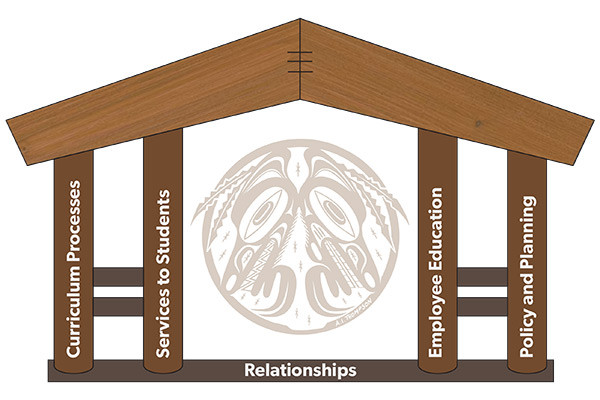Indigenization is a strong indicator of Camosun鈥檚 leadership role in regards to Indigenous adult education in British Columbia and beyond. Depicted as the Four Corner Post model, Indigenization is reflective of the traditional longhouses of the Lekwungen and W瘫S脕NE膯 peoples upon whose territories the college resides.

"When those who have power to name and to socially construct reality choose not to see you or hear you鈥� when someone with the authority of a teacher, say, describes the world and you are not in it, there is a moment of psychic disequilibrium, as if you looked in to a mirror and saw nothing."
Adrienne Rich
We recognize that it is important for Indigenous learners see themselves and their communities reflected in strength and beauty in programs and courses across the college.
The focus of Indigenization is bringing Indigenous ways of being, knowing and doing to the learners. It is also critical to acknowledge that the ongoing social, cultural and economic issues that are faced in Indigenous communities stem from a shared history of colonization. Resolution requires that we learn together.
麻豆约拍 has the following Indigenization goals:
- Indigenous students see themselves and their realities reflected in the curriculum in which they engage
- Non-Indigenous students come away from the college equipped with knowledge and processes that enable them to develop stronger and better-informed relationships with Indigenous peoples
To support this goal, departments/instructors involved in program and/or course review are asked to briefly describe how curriculum/teaching learning experiences have been indigenized.
To learn together, we:
- offer a variety of Indigenous programs led by Indigenous instructors;
- develop Indigenized courses聽 in consultation and collaboration with community focus groups, and;
- work with instructors, curriculum designers and the Centre for Excellence in Teaching and Learning to support instructors to Indigenize courses and programs.
Instructors in Indigenous programs bring the content to life through experiential learning opportunities such as:
- Elder and knowledge keeper teachings;
- circle seminars;
- storytelling;
- learning on the land; and
- organizing and participating in community events.
Learners further explore Indigenous world views through the works of Indigenous scholars, leaders, novelists, filmmakers, and artists. Many instructors in mainstream programs also bring Elders and Indigenous scholars into the classroom and bring learners into communities.
For more information on curriculum development and delivery please see the聽Pulling Together: A Guide for Curriculum Developers. For further support Indigenizing curriculum, you can connect with the聽Education Developer, Indigenization and Sustainability.